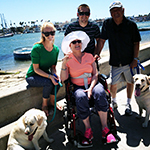A Young Caregiver’s Story
Katie
About 7 years ago my mom was diagnosed with brain cancer at the age of 50. She was a zero-handicap golfer, avid skier, fisher-woman, and lover of all things outdoors. I’m guessing that is all mostly because she is from New Zealand. She was diagnosed in 2007 with a large but low-grade oligo-astrocytoma brain tumor.Of course the news was shocking, but if anyone was up for the challenge, it was my mom. Through two craniotomies, countless rounds of chemotherapy, radiation, and a gamma-knife procedure, she has been a champion. In January of 2013, it was a crisp and cold Saturday when I got a call from my dad saying that mom been in an accident on the golf course and was hospitalized. We didn’t realize that one of her craniotomies had left her with a peripheral visual deficit, causing her to not see the tree she crashed the golf cart into on the golf course. She broke her neck and suffered a traumatic brain injury. It was on this day in January that my role as daughter now involved being a full-time caregiver as well. And let me tell you why it is the best job in the world.
First of all, I don’t consider what I do to be a typical “job”. It involves all the same requirements that high-level caregiving demands, as is required for most brain cancer patients. But my job is special. I am not just a caregiver, but an entertainer, event planner, personal assistant, chauffeur, personal shopper, private chef, art therapist, physical trainer, expert listener, activity director, and a shoulder to cry on. Brain cancer and all the treatment involved can take a toll on all those involved, and it can happen unbelievably quickly. If I were to give advice to myself twenty-five year old self before becoming a full-time caregiver for my mom, I would have this to say:
1.) Get organized. There will be lots of doctors appointments and hospital visits, its helpful to have one binder with a list of current meds, doctor’s names/phone and fax numbers. Ask for copies of all bloodwork, MRI Discs, written reports, etc. and keep them in this binder.
2.) Get 2nd opinions. One doctor’s way of doing things is not the end all, be all. (this is why it’s good to have copies of all your scans and reports so you can easily provide them with the patient’s medical history during your consulations.)
3.) Don’t try to make everybody happy. It’s hard enough to be a caregiver, and there are people in your life who will ask things of you and its ok to say no. I’ve found that so many people wanted to visit my mom after she got sick, and it was too overwhelming for her.
4.) It is ok to cry and laugh at the same time. Actually, we do this almost daily and it feels really good. Life is too short not to.
5.) Learn to go with the flow. It is great to stay organized with a planner, but use pencil because you will need to be flexible when health situations arise, and they will.
6.) Get support from anywhere you can. I have found it incredibly therapeutic to go to a brain tumor support group. Those people understand you in ways other friends might not, and that kind of acceptance and appreciation will take you far as you go along this journey.
7.) Be open to love, be open to laughter, and find happiness in the little things. We are all fulfilling our destiny together, and every person has their own battles to fight. Be kind to receptionists, nurses, medical assistants, and ask their name. Get to know them, and it is absolutely incredible the lengths they will go to help you out. Never underestimate the power of kindness.
8.) Be thankful. This is a job that very few people will ever experience, and the life lessons you will learn on this journey with your loved one are priceless. Appreciate your own health, and be gentle with yourself.
9.) Don’t live in the past. That’s why it is the past. Be hopeful, be positive, and be PRESENT. Take one day at a time, one hour at a time, even one minute at a time if that is what is needed.
We can’t help what has happened already, but we can choose how we handle the current situation. My mom can’t walk anymore so I can’t take her golfing or out fishing on our boat like we used to, but I can take her to a movie in her wheel-chair or to the park with our labrador. As country-singer Garry Allan puts it, “Life ain’t always beautiful, but it’s a beautiful ride.” Thank you for letting me share my journey with you. I wish you the best on yours.



